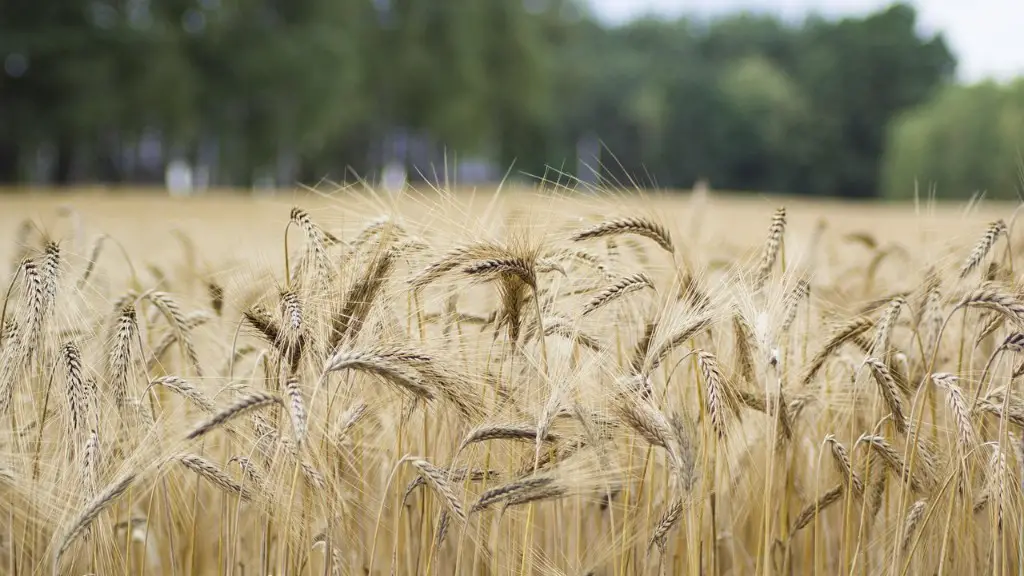Agriculture offers a vast array of interesting and rewarding career opportunities. From traditional farming to the newer agricultural technology and science fields there are plenty of options available to those looking to apply their knowledge and passion towards a career in agriculture. The following sections will examine some of the most popular careers in the agricultural industry, exploring their benefits and drawbacks.
Agricultural Business
Agribusiness covers all aspects of farming from large-scale operations to small family-run farms. These businesses are responsible for production, marketing, and selling crops, livestock, and related products. Work may involve managing financial operations, applying for loans and grants, and devising marketing strategies. Those interested in agribusiness should have a sharp eye for detail, possess the ability to strategize and a passion for the agricultural industry.
Food Production
Food production requires an understanding of the entire agricultural cycle, from crop production to food processing and packaging. Those working in food production may specialize in one area or take on a more general role that encompasses several disciplines. Food production professionals help to ensure the quality of food, tracking food sources and ensuring adherence to dietary and quality regulations.
Research and Development
Agricultural research and development focuses primarily on the development of new agricultural technologies and processes. Researchers examine new farming techniques, crop selection, soil management, and other aspects of agricultural science. By contributing to the advancement of agriculture, agricultural researchers help improve the quality and quantity of food production while reducing waste and promoting sustainability.
Land Management
Land management involves managing a wide range of issues related to farming and the environment. Land managers work with farmers and land owners to maximize the use of agricultural land. This can include soil conservation, crop selection and rotation, water management, and wildlife management. Land managers are also responsible for evaluating land as a source of timber and providing advice related to conservation issues.
Livestock Management
Livestock management involves managing animal production, health, and welfare. Professionals in this field are responsible for the health and growth of farm animals, ensuring that their nutrition, living conditions, and care are at optimal levels. Livestock management professionals may also be responsible for breeding animals and developing animal-related products.
Marketing and Communications
Marketing and communications professionals are responsible for creating and managing awareness and promotion of agricultural products, programs, and services. This includes developing effective communication strategies, attracting investors and partners, and building relationships with customers and stakeholders. Professionals in this field should have a good understanding of the agricultural industry, marketing principles, and the latest communication trends.
Educator and Extension Agent
Agricultural educators and extension agents help to educate and inform farmers, ranchers, and the general public about agriculture. They share their knowledge and expertise through various forms of media such as workshops, seminars, and classroom sessions. Educators and extension agents should have a passion for agriculture as well as excellent communication skills.
Agricultural Consultant
Agricultural consultants are hired by farmers, agribusinesses, and other organizations to provide advice and guidance on a variety of topics related to farming and the agricultural industry. Consultants assess conditions, provide solutions, and help implement plans to achieve desired results. An agricultural consultant should have a good understanding of business management, economics, and agricultural production principles.
Farm Equipment Operator
Farm equipment operators are responsible for operating and maintaining a range of agricultural equipment. This may include tractors, planting and harvesting equipment, and other implements. Operators must have a good understanding of the functions of their equipment as well as the ability to perform regular maintenance, troubleshoot and diagnose problems, and adjust settings as needed.
Forestry and Wildlife Management
Forestry and wildlife management professionals manage vast forests to ensure they remain healthy and productive. This can include managing timber production, wildlife habitat, and preventing illegal activities such as poaching. These professionals should have a good understanding of the different types of ecosystems, climate, and wildlife management techniques.
Agricultural Engineering
Agricultural engineers apply engineering principles to the design, construction, and operation of agricultural systems. These professionals may specialize in the design and operation of large equipment, design water and drainage systems, or develop new technologies to increase efficiency and decrease waste. Agricultural engineers should possess strong technical and problem-solving skills.
Hydrology and Water Quality
Hydrologists and water quality professionals help monitor, protect and manage water resources. They assess water availability, quality, and use, develop regulatory compliance plans, and advise communities on water management practices. Hydrologists must have strong understanding of water science and engineering principles and have good problem-solving and communication skills.



